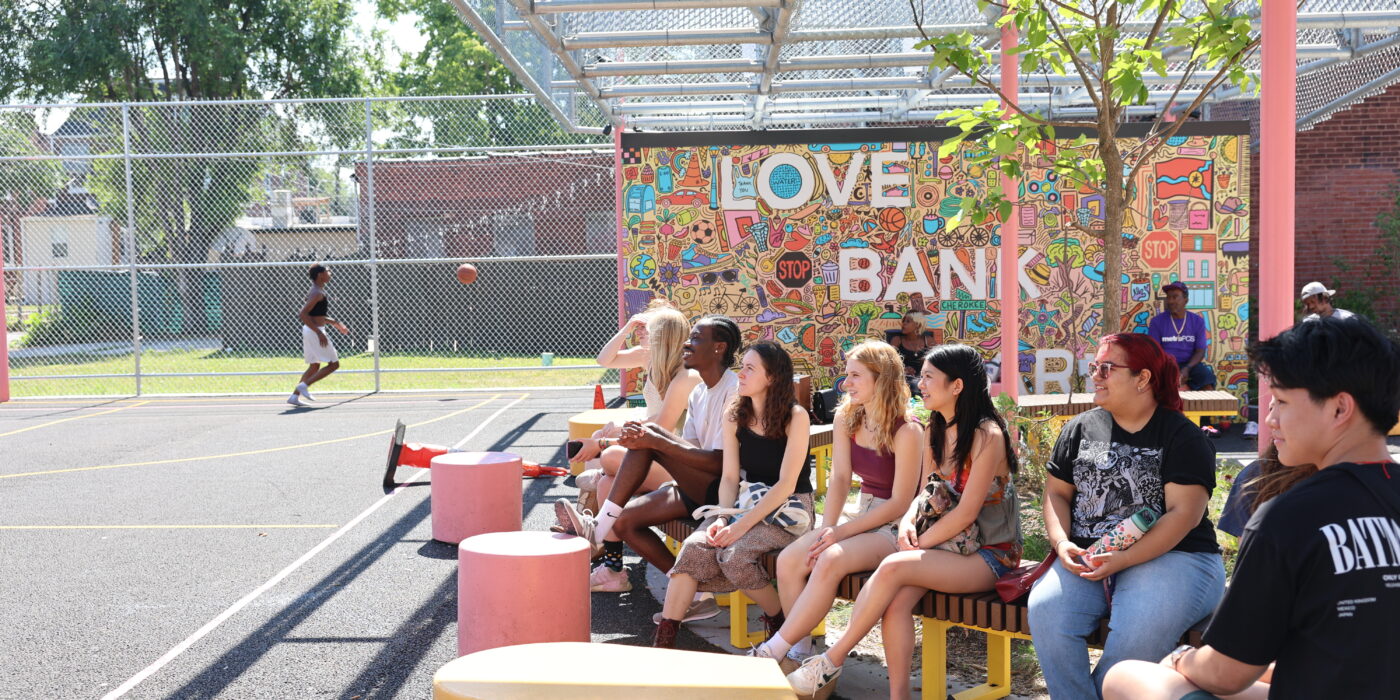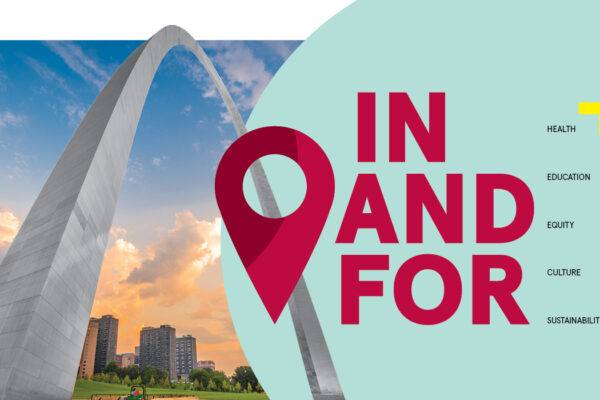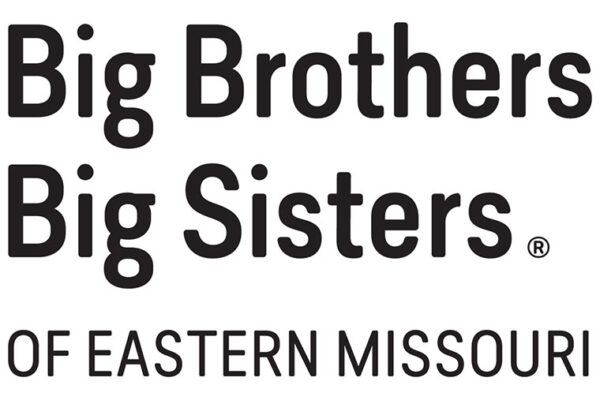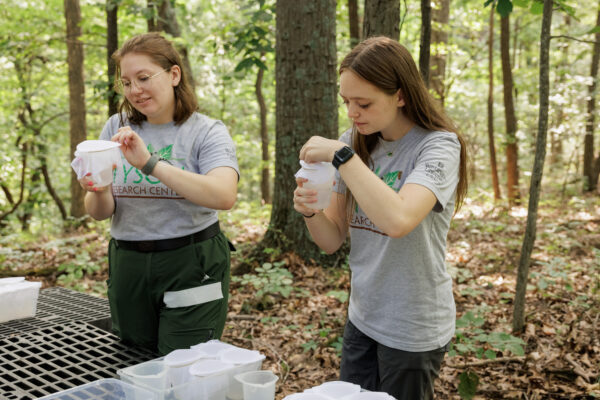The St. Louis Fellows Program at Washington University is not a career development program, though it connects students to summer internships at local nonprofit and civic organizations. It is not a history course, though it dives deep into the political, economic and cultural forces that shape the St. Louis region. Nor is it a financial aid initiative, though fellows receive a large stipend to live and learn in St. Louis.
At its heart, the St. Louis Fellows Program is a commitment to the region. And St. Louis Fellows make St. Louis stronger, healthier and more vibrant through their summertime actions, such as dressing bullet wounds at the Bullet Related Injury Clinic, supporting caregivers at the Alzheimer’s Association Greater Missouri Chapter, and developing education programs at the Contemporary Art Museum St. Louis. WashU’s Gephardt Institute for Civic and Community Engagement manages the program and covers the full cost of stipends for the fellows.
“The focus of the St. Louis Fellows Program has always been capacity building for our regional organizations so they can accomplish mission-critical work,” says Stephanie Kurtzman, the Peter G. Sortino executive director of the Gephardt Institute. “As the Fellows Program has grown each year, it’s been amazing to see what a community of talented, trained and energetic students can achieve in a summer.”
Jaqueline Marquez Salgado of Kansas City is one of those students. A sophomore studying sociology in Arts & Sciences, she interned this summer at the MICA Project, a holistic legal services provider that supports low-income immigrants and refugees. Founded by two WashU law school alumnae, Nicole Mejía, AB ’06, JD/MSW ’12, and Jessica Mayo, JD ’12, the MICA Project handles more than 1,000 cases every year.
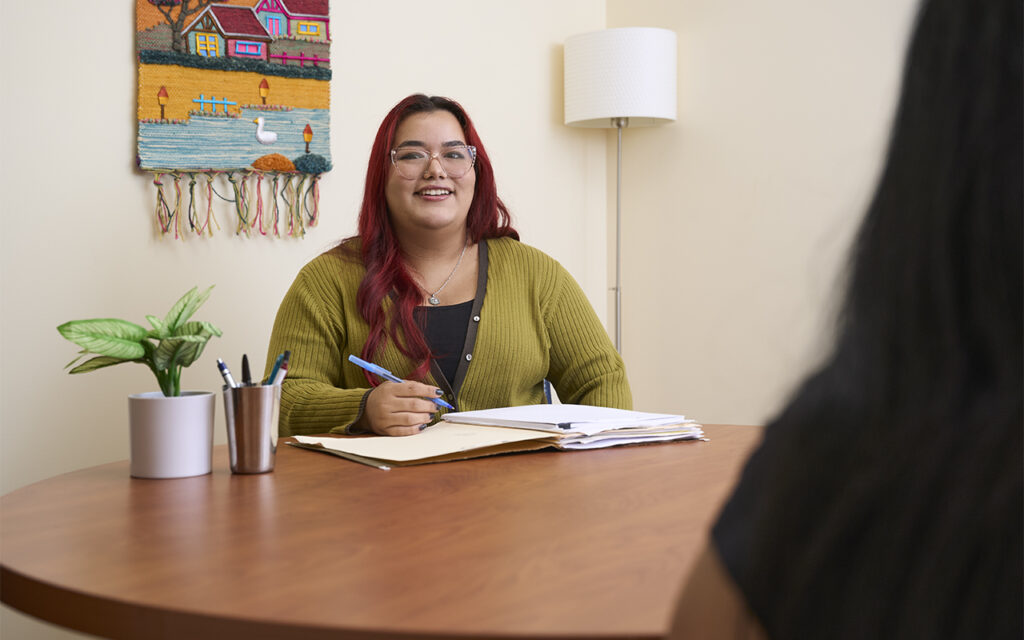
During her internship, Marquez Salgado translated affidavits, connected families to medical care, helped clients complete their visa applications and more. The work was sometimes tedious, sometimes heartbreaking, but always enlightening.
“It’s so important to be in the room where it happens,” says Marquez Salgado, who aspires to be an immigration attorney herself. “Cases can take years to resolve and not always in the way you’d hoped. But every day, I had the opportunity to see how this work comes together: how decisions are made, how people within an organization work together, how many different roles everyone must take on.”
Stephen Lightle, a Department of Justice–accredited representative and Marquez Salgado’s supervisor, says employees and clients alike trusted Marquez Salgado and that he would eagerly onboard future fellows from WashU. Smart, energetic self-starters who are committed to the work and come at no cost? He says, “Yes, please.”
But equally important, Lightle says today’s fellows are tomorrow’s champions.
“The need is far outpacing what legal service providers can deliver right now,” Lightle says. “So maybe in a few years, these fellows will become an accredited rep, an attorney or just someone out there talking to their neighbors about the issues facing immigrants and refugees. We need to usher in the next generation of such advocates.”
Creating a model for student-community partnerships
The St. Louis Fellows Program traces its roots to 2008, the year the Gephardt Institute launched the Goldman Fellows Program with the support of alumnus Benjamin Goldman-Israelow, MD, AB ’06, and his family’s foundation. Goldman-Israelow spent his undergraduate summers in St. Louis working in various labs. During his free time, he visited new attractions, attended new events, explored new neighborhoods and met new people.
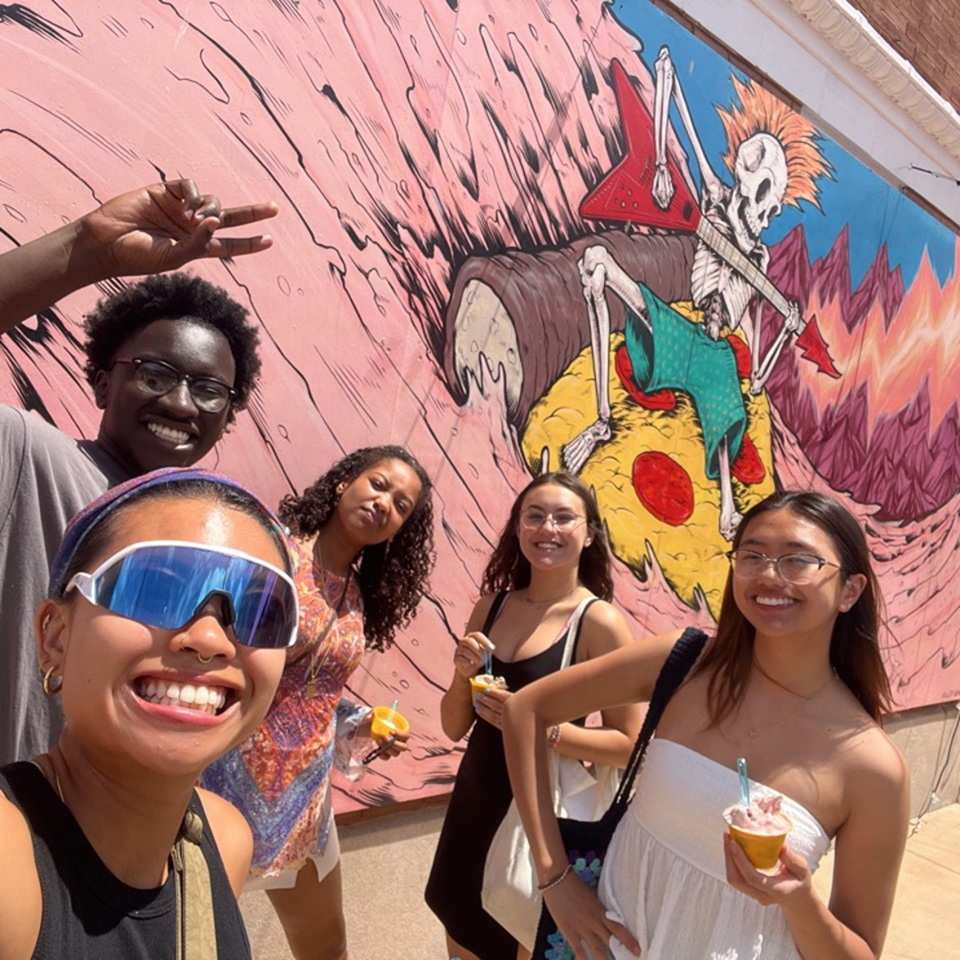
“St. Louis really comes alive in the summer,” recalls Goldman-Israelow, assistant professor of medicine at Yale School of Medicine. “Growing up in New York, I naively assumed all cities were like New York but smaller. But every city has its own culture and history. During the summer, I got to connect to St. Louis in a way that I was never able to during the school year.”
Goldman-Israelow valued that experience and wanted more students to have the same opportunity. He imagined a cohort experience open to all students, regardless of school or major. The fellows would learn about St. Louis, meet its leaders, work at a nonprofit or government agency of their choice, and, importantly, receive a stipend to cover a student’s living expenses. Today, each fellow receives $6,500; limited-income students receive $7,500.
“Unpaid internships are a luxury for people of means,” Goldman-Israelow says. “It’s an equity issue. We didn’t want to say, ‘You can be part of this group only if you can support yourself.’”
The program officially launched with a cohort of 10 students. Since then, the Gephardt Institute has added additional fellowship programs to support specific partners and populations. For example, the John C. Morris Fellows work at the Alzheimer’s Association Greater Missouri Chapter; Arts as Civic Engagement Fellows are placed at regional arts nonprofits; Democracy Fellows work at government agencies and for nonpartisan voting organizations; and the WUpan Fellow supports local LGBTQ+ nonprofits. Along with the Goldman Fellows and Mosbacher Fellows, funded by Merry Mosbacher, MBA ’82, and Jim Mosbacher, these programs make up the broader St. Louis Fellows Program. In total, 40 St. Louis Fellows worked at 31 organizations in 2024. Kurtzman hopes to grow the St. Louis Fellows Program to 100 students in the coming years.
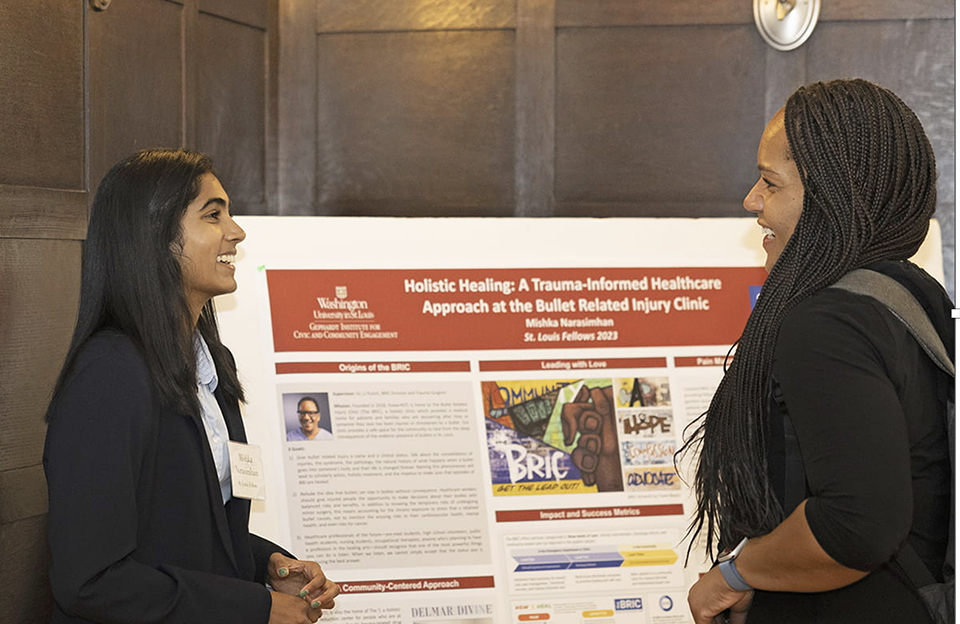
“In many cases, fellows carry on the work of their predecessors, building on past successes,” Kurtzman says. “By making an ongoing commitment, we are able to help our partners achieve more.”
Since the launch of the Goldman Fellows Program, other WashU programs and schools have launched their own summer stipend programs. Examples include the George and Carol Bauer St. Louis Summer Community Internship for Danforth Scholars, the Pivot 314 Program for graduate students and the St. Louis Internship Program for Biomedical Engineers for students in the McKelvey School of Engineering.
Chancellor Andrew D. Martin wants to offer more stipend programs and cites the St. Louis Fellows Program as a model.
“The St. Louis Fellows Program accomplishes two goals central to WashU’s mission: It prepares our students to be leaders in the workplace and the community, and it advances our commitment to be ‘In St. Louis, For St. Louis,’” Martin says.
Developing civically minded leaders
Julian Nicks, BSBA ’13, and Dung Tran, a sophomore at Olin Business School, have a lot in common. Both want to create career pathways for the un- and underemployed, both believe in the power of social entrepreneurship, and both were Goldman Fellows (Nicks in 2011 and Tran in 2024).
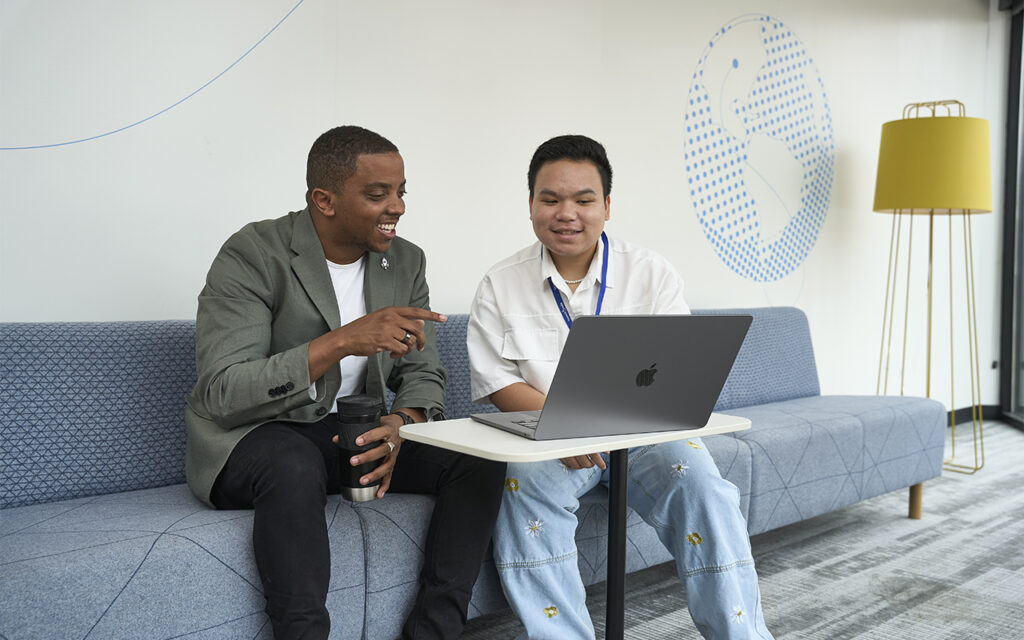
Nicks says the fellowship changed the trajectory of his career. He interned at a St. Louis–based charter school with a terrific mission but an unsustainable business model. The experience showed Nicks he needed to learn more about management and strategy. So he went to work at the leading consulting firm Bain & Company and received an MBA from Stanford Graduate School of Business. Nicks then served as CEO of LaunchCode, a national nonprofit based in St. Louis that provides tuition-free technical training and access to good-paying jobs.
He also was a mentor to Tran, who tracked job outcomes for graduates during his summer internship at LaunchCode. That work is helping the nonprofit build relationships with employers and attract new donors.
“We need more people to choose careers that tackle the bigger societal issues,” Nicks says. “The Goldman Fellows Program put me on that path, and I hope we inspired Dung in the same way.”
“Absolutely,” Tran says. Yes, he learned a lot about nonprofit management, but that’s not all.
“For me, the best way to learn is by listening to other people’s experiences,” Tran says. “That’s a big reason why I wanted to join the fellowship, so I could meet people from Sam Fox and McKelvey and ArtSci. Having a business mindset and understanding the data can help you solve a lot of problems, but you always need to listen to other viewpoints and work collaboratively.”
That lesson will serve Tran and his classmates well no matter where the future takes them, says Sarah Nash, community engagement manager for the Gephardt Institute.
“We need civically engaged teachers and architects and doctors,” Nash says. “The skills fellows are learning today in the program are transferable to any career path. It’s my hope that some of them stay in St. Louis, but this experience will serve them no matter where they go or what they do.”
